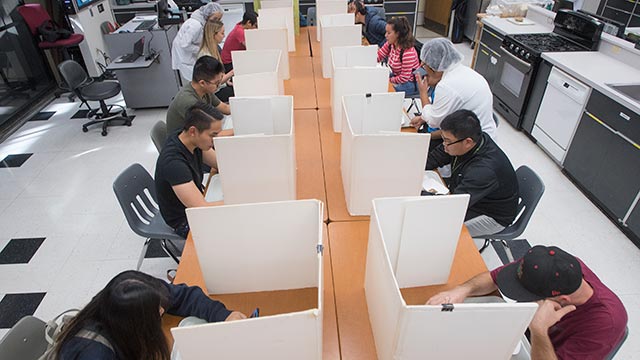The students sit in rows, hunched over their desks and focusing intently on what's in front of them.
They appear to be gearing up for a test, but this isn't your typical college exam. It's a taste test - or in the vernacular of the food science world, a sensory evaluation.
The testing takes place in the kitchen processing labs of Cal Poly Pomona's food product development class. The students tasting and assessing the foods come from across the campus and serve as guest consumers trying out the new products developed in the class.
The student food developers, who are part of the Huntley College of Agriculture's nutrition and food science department, plan to become food scientists - the people who research and develop products such as the cereals, soups, nutrition bars and many more items that line supermarket shelves.
Looking for a beef jerky alternative? Students created a vegan jerky that they list as a good source of calcium and vitamin C. Another team pitched a children's product called a "Diparoo" - a test tube-shaped cookie that is dipped into a blueberry sauce and a cauliflower-based pudding. The child gets the fun of dipping and learns about the naturally occurring color change of antioxidants, while also consuming nutrients in fruits and vegetables.
Yet another clever concoction- frozen-milk cereal balls. Students created a small, ball-shaped product filled with pudding and whey to give it a milky texture, and sweet potatoes to bind cereal to the ball. The product is frozen and packed, and the idea is that the consumer puts it into the toaster to have cereal on the go.
The sensory evaluation gauged such qualities as the product's chewiness, hardness, color, sweetness and saltiness. Afterward, students will examine all the feedback and then improve and refine their product through more work in the lab. The process reflects the intense experimentation and analysis done by food scientists, said lecturer Dianne Thuy Trinh.
The class embodies hands-on learning. Students start from scratch and create a finished, meticulously formulated product they will showcase and present at the end of the semester. Past products have included mango rice sticky balls and healthy oatmeal cookies.
Getting to the end goal involves a rigorous process that requires a range of skills, including scientific analysis, critical thinking, knowledge of food safety and nutrition, creativity and innovation, and the ability to communicate effectively.
"I think the students grow quite a lot in this class," said Assistant Professor and Culinology® coordinator Gabriel Davidov-Pardo, who teaches food product development with Trinh, a veteran of the food industry and also the coordinator of the Food Science and Technology Program Internship.
Students learn how to troubleshoot and overcome technical challenges. Even time management is a vital skill; you have to work fast, whether preparing a product or cleaning up afterward. As Trinh notes, when you're working in a paid food-industry job, "they're not going to wait for you."
To create their products, students break off into groups of four or five and work closely together throughout the semester. Each person has a different role, such as managing the project, creating a food-safety plan, overseeing sensory evaluation, dealing with formulas and ingredients, and handling packaging and labeling.
"Teamwork is very important in this class," Davidov-Pardo said.
These food science and technology students say it's eye-opening to realize all the behind-the-scenes work that goes into the food they're buying in stores. Food science is "a very hidden field," said senior Matthew Nguyen.
Students are also trying to qualify their handiwork for one of several national and regional collegiate food-product competitions. Winners receive recognition and a cash prize as high as $1,000. Competing in such an event would be a significant career boost, enhancing one's resume and earning a chance to network with food industry professionals, said senior Rosanna Eldumiate.
"And you get money," she added with a smile. "That's always nice too."


